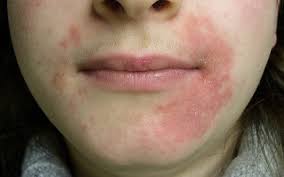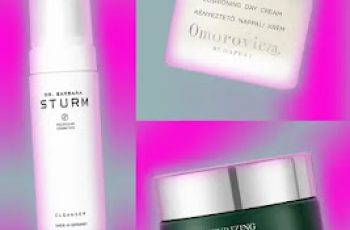
Dry Skin Around the Mouth: Causes, Prevention, and Effective Treatments
Dry skin is something many people deal with at some point, and while it can occur anywhere on the face or body, having dry skin around the mouth presents its own unique challenges. The skin in this area is highly visible, delicate, and constantly in motion. Whether you’re eating, talking, smiling, or just breathing, the skin around your mouth is almost always active—and this can make dryness there particularly uncomfortable and frustrating.
You might notice your skin flaking, feeling tight, or even burning or itching. For many, the condition is not only uncomfortable physically but also impacts their self-esteem and confidence. So, if you’re dealing with this type of dryness, know you’re not alone—and that there are both explanations and solutions available.
To help demystify this common skin issue, we spoke with board-certified dermatologists Dr. Nava Greenfield and Dr. Debra Jaliman. In this guide, we’ll explore the most common causes of dry skin around the mouth, how to prevent it, and the best treatments you can use to keep your skin soft, smooth, and healthy.
Why Is the Skin Around Your Mouth Prone to Dryness?
It’s important to understand that the skin around your mouth is naturally different from the skin on other parts of your face. While it’s structurally similar to the rest of your facial skin, it contains fewer sebaceous (oil) glands. According to Dr. Jaliman, this lack of oil glands means the skin in this area doesn’t have the same natural barrier against moisture loss. As a result, it’s more prone to dryness, irritation, and sensitivity—especially when exposed to environmental stressors.
Let’s dive into the most common causes.
Common Causes of Dry Skin Around the Mouth
1. Environmental Factors
Environmental conditions play a major role in the health of your skin, especially around the mouth. Some of the most impactful environmental triggers include:
Cold Weather: Winter air is dry, and heating systems make indoor air even drier. Just as your lips can chap in the winter, so can the surrounding skin.
Wind Exposure: Wind strips moisture from the surface of the skin, causing chapping, redness, and peeling.
Sun Exposure: The skin around your lips gets a lot of sun but is often neglected when it comes to SPF application. Over time, this sun exposure damages the skin’s barrier and leads to persistent dryness.
Low Humidity Environments: If you live in a dry climate or use central heating or air conditioning, you may find your skin is always craving moisture.
2. Irritating Skincare or Dental Products
Sometimes, the culprit behind dry skin is sitting right on your bathroom shelf. Harsh skincare or oral hygiene products can contribute to dryness and even trigger allergic reactions or contact dermatitis.
Toothpaste & Mouthwash: Dr. Jaliman notes that certain toothpaste ingredients—particularly cinnamon flavoring or strong mint oils—can cause irritation for some people. Sodium lauryl sulfate, a foaming agent found in many toothpaste brands, can also be drying.
Flavored Lip Products: Lip balms or glosses with fragrance or artificial flavors may taste or smell good but can trigger irritation, especially if you lick your lips more often because of them.
Fragranced Skincare Products: Anything with added fragrance—cleansers, creams, or lip balms—can increase the risk of dryness, particularly for those with sensitive skin.
3. Habits That Exacerbate Dryness
Some everyday habits might seem harmless but can actually make dryness worse.
Lip Licking: One of the most common habits that worsens dry skin around the mouth. Saliva contains enzymes meant to break down food—not moisturize skin. When it evaporates, it takes natural moisture with it.
Frequent Wiping or Touching: Constantly wiping your mouth (especially when eating or wearing a mask) can wear away the skin barrier.
Breathing Through the Mouth: Whether due to congestion or habit, mouth breathing can dry out the area around the lips over time.
4. Skin Conditions
Several medical conditions can lead to chronic or recurring dry skin around the mouth:
Angular Cheilitis: This condition affects the corners of the mouth and is often triggered by yeast or bacterial overgrowth. It can cause redness, cracking, and discomfort.
Eczema (Atopic Dermatitis): Eczema can appear anywhere, including around the mouth. It’s characterized by itchy, red, dry patches that may flare up due to stress, allergens, or weather changes.
Perioral Dermatitis: A more severe inflammatory skin condition that often presents as a red, bumpy rash around the mouth. It’s typically caused or worsened by overuse of topical steroids or irritating skincare products.
Psoriasis: Though less common around the mouth, psoriasis can cause dry, scaly patches here as well.
How to Prevent Dry Skin Around the Mouth
When it comes to skincare, prevention is key—and often easier than treatment. Here are dermatologist-approved tips to keep the skin around your mouth hydrated and healthy:
1. Simplify Your Routine
Stick to gentle, fragrance-free products, especially in the areas around your lips and mouth. Look for soothing and barrier-repairing ingredients like:
Ceramides
Hyaluronic acid
Glycerin
Squalane
Avoid products with retinoids, AHAs, BHAs, or sulfates in this area unless recommended by a dermatologist, as these ingredients can strip moisture and cause irritation.
2. Use Lip Products Without Flavors or Fragrance
Flavored balms might tempt you to lick your lips more often, which only leads to more dryness. Instead, opt for fragrance-free, hypoallergenic formulas, ideally with SPF to protect against sun damage.
3. Switch to Dental Products for Sensitive Gums
Dr. Jaliman recommends using toothpaste and mouthwash labeled for sensitive users. These tend to be free of harsh detergents and irritating flavors.
4. Cover Your Face in Harsh Weather
Use a scarf or face mask to shield your skin from the wind and cold. This provides a barrier against moisture loss and protects from environmental aggressors.
How to Treat Dry Skin Around the Mouth
Already experiencing dry, flaky skin around your lips and mouth? Don’t worry—there are effective ways to restore hydration and comfort.
1. Apply a Barrier Cream or Healing Ointment
After cleansing, apply a thick layer of a barrier repair cream or an occlusive ointment (like petroleum jelly or a lanolin-based balm). These seal in moisture and help the skin repair itself.
Great ingredients to look for:
Ceramides: Help rebuild the skin’s barrier.
Hyaluronic Acid: Draws water into the skin.
Panthenol (Vitamin B5): Soothes irritation and supports healing.
2. Use a Gentle, Hydrating Cleanser
Avoid foaming or exfoliating cleansers, which can strip natural oils. Instead, use a creamy, non-foaming, sulfate-free cleanser.
3. Add a Humidifier to Your Room
Using a humidifier, especially in winter or in dry climates, helps your skin retain moisture overnight. It’s one of the easiest and most effective ways to support your skin’s hydration.
4. Avoid Harsh Treatments in This Area
When using active treatments like exfoliating acids or retinoids, apply them carefully around the mouth or avoid the area altogether if you’re prone to dryness.
When to See a Dermatologist
While most cases of dry skin around the mouth are treatable at home, there are situations where professional help is needed. You should see a board-certified dermatologist if you experience:
Painful cracking
Persistent redness or swelling
Rashes or bumps
Bleeding
Oozing or signs of infection
These symptoms might point to more serious conditions like perioral dermatitis, angular cheilitis, or allergic reactions that require prescription treatment.
The Bottom Line
Dry skin around the mouth is a common issue that can arise from a mix of environmental conditions, habits, skincare products, or underlying skin conditions. While it may feel frustrating, there are plenty of effective ways to treat and prevent this type of dryness. The most important step is to treat the skin gently, avoid irritating ingredients, and nourish it with hydrating, healing products.
By making small changes in your skincare routine and daily habits, you can restore moisture, reduce irritation, and keep your skin looking and feeling its best—no matter the season.


